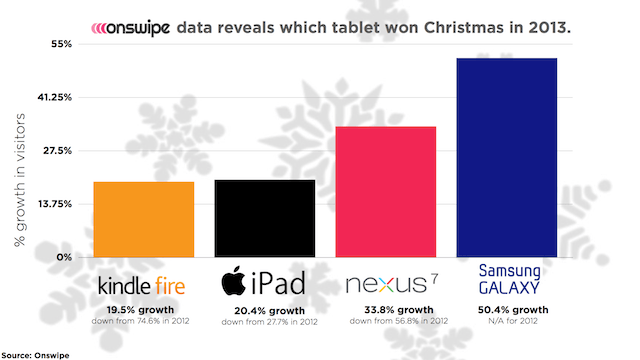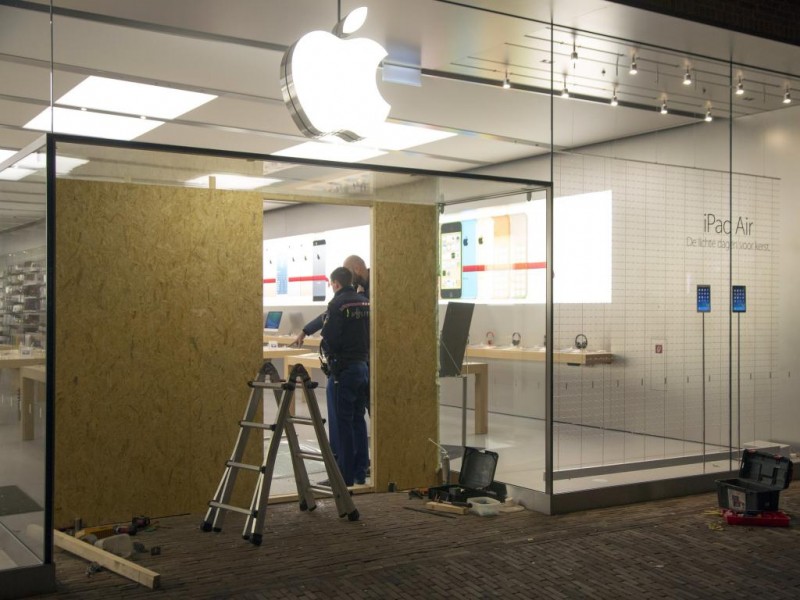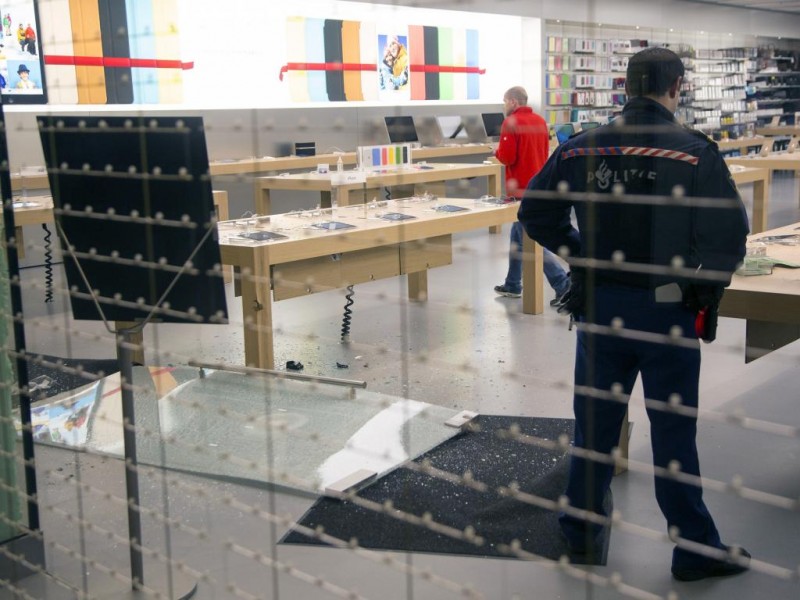Over the course of 2013, Apple released a number of exciting new products, including the radically redesigned
Mac Pro, a thinner and lighter
iPad Air, and an iPhone with cutting edge
fingerprint recognition technology.
2014 will likely bring even more innovation to Apple's product lineup, with current rumors hinting at highly anticipated products like the Apple smart watch, a larger iPhone and iPad, and new developments with the Apple TV. A number of these products have been rumored for some time, but the spate of Apple product releases over the past few months and the imminent turning of the calendar offers a chance to bring those rumors back to the forefront.
According to Apple CEO Tim Cook, Apple has plans to create "great products" in areas the company does not participate in today, and in a recent email, Cook told Apple employees that there's a lot in store for Apple in 2014, "including some big plans that we think customers are going to love."
In the list below, we've highlighted Apple's prospective 2014 product plans, outlining what customers might see from Apple in the next 12 months based on current rumors.
iPhone 6
Apple's next iPhone is rumored to come equipped with a larger screen size, somewhere between 4.7 and 5.7 inches. Some rumors have suggested that Apple might release the phone in two separate sizes, both of which are larger than the current 4-inch iPhone 5s/5c.
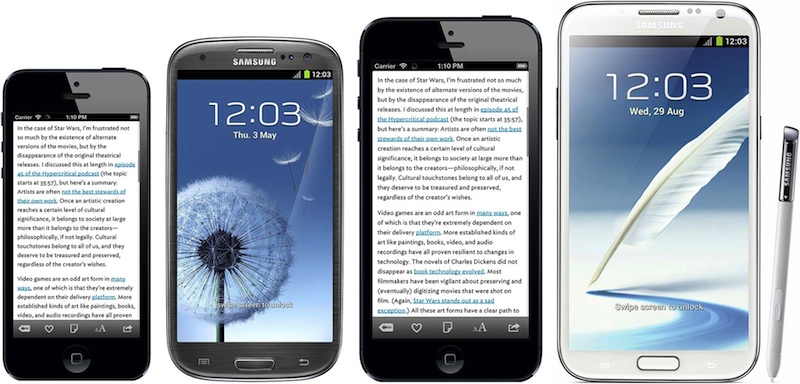
Left to right: iPhone 5, Galaxy S III, "iPhone Plus", Galaxy Note II (Source: Marco Arment) The larger iPhone, which will likely incorporate a faster 20-nanometer A8 chip from TSMC, may also include sweeping design changes in the form of a curved display. While it is possible Apple will release an updated iPhone earlier in the year, the most likely release target for the larger-screened device is September or October.
Read full roundup for iPhone 6
iPad Pro
Along with a larger iPhone, Apple may be planning to add a larger iPad to its current tablet lineup, which comprises the 9.7-inch iPad Air and the 7.9-inch iPad mini. The "iPad Pro" or "iPad Maxi" as it has been called by the media, is rumored to include a larger 12.9-inch display, which would be most similar in size to the current 13.3-inch MacBook Air.
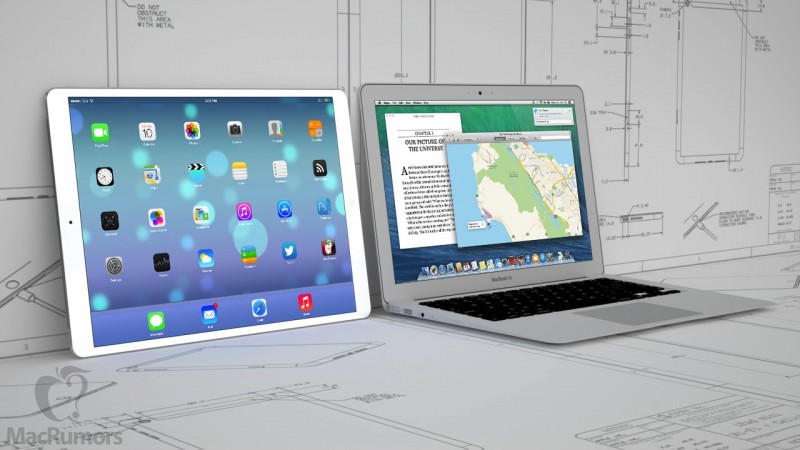
Mockup of the 12.9-inch iPad next to a 13-inch MacBook Air The display reportedly offers higher pixel density nearing
ultra high-definition quality and it will likely adopt many of the design elements offered in the current iPads, like an ultrathin chassis and narrow side bezels. Aside from a larger screen size, not much is known about Apple's larger iPad, and it is unclear when such a product might be released.
iWatch
Apple's much-anticipated "iWatch," which was a major rumor focal point in 2013, will likely be released in 2014. According to rumors, the smart watch will primarily function as an accessory to the iPhone and the iPad, providing at-a-glance access to common iOS functions.
The watch may also include a multitude of biometric functions, possibly offering a pedometer and heart rate monitor, among other things, and it could also serve as a home automation hub. While it is entirely unclear what the iWatch will look like, rumors have indicated that it could have an OLED display in the range of 1.3 to 1.7 inches, possibly coming in multiple sizes for a customized fit.
Apple's iWatch may incorporate an ultra durable sapphire glass screen, as the company recently signed a deal with GT Advanced to ramp up sapphire glass production. Rumors have also hinted at a flexible, curved design.
Over the course of 2013, Apple ramped up its work on the iWatch, with a team of 100 product designers working on the project. The company also filed for iWatch trademarks in multiple countries throughout 2013.
Currently, Apple's iWatch is expected to debut during the second half of 2014.
Read full roundup for iWatch
Apple Television
Apple has been long rumored to be making some upgrades to its Apple TV, either in the form of a revamped set top box with additional functionality or a full blown television set. It is unclear what Apple will do in the television arena in 2014, however, as rumors have suggested that the company has shelved its TV plans for the time being in order to focus on wearables like the iWatch. Television remains an area of "intense interest" for Apple, according to Tim Cook.
If Apple does release a television-related product in 2014, it will likely be a new set top box that could bundle key features like an App Store and Siri, along with additional content offerings.
In 2013, Apple worked hard to beef up content offerings, adding several new channels, including WatchESPN, HBO GO, Vevo, Yahoo Screen, and PBS. The company is also said to be in talks with cable provider Time Warner and a deal with that company, as well as other improvements in content, could come in 2014.
Improving content and reaching deals with various cable companies and content providers is a necessary step before Apple can make headway in the television industry.
Read full roundup for Apple TV
4K Display
Many people believed Apple would introduce a new Thunderbolt Display alongside the Mac Pro, as it has been two years since the last Thunderbolt Display update. No new display appeared, but it is possible that the company will debut a new display product in 2014, likely offering a 4K resolution of 4096 or 3840 x 2160 pixels.
In late 2013, Apple supplier AU Optronics introduced new 27 and 32-inch 4K display panels, sparking speculation that revamped Thunderbolt Displays were on the horizon, though concrete information on a new display or a possible release date is unavailable at the current point in time. In lieu of a 4K Thunderbolt Display, Apple is offering a 4K 32-inch Sharp display as an add-on to the Mac Pro.
Read full roundup for Apple Displays
Other updates: iOS 8, OS X 10.10, MacBooks, and More
As it does every year, Apple will undoubtedly offer refreshed MacBooks over the course of 2014. Recently, a rumor has suggested that a 12-inch MacBook with a MacBook Air-style design and a Retina display could make its debut in the middle of 2014, and other incremental updates to products like the Retina MacBook Pro will come as well.
Apple has several products that have not been refreshed for quite some time, including its lineup of iPods and the Mac Mini, which could see updates in 2014.
New versions of both iOS and OS X are also expected, though few details are available on the software at this time. iOS 8 may include improvements to Maps, iOS in the Car, and a possible Siri API, while the next version of OS X could take on some iOS 7-style design elements. iOS 8 will probably arrive during the fall along refreshed iPhones, and it is likely that a revamped version of OS X will come during the same general time frame.
Related roundups:
iPhone 5c,
iPhone 5s,
iPhone 6,
iPad Air,
Mac mini,
MacBook Air,
Apple TV,
MacBook Pro,
iWatch
Just keep Jony away from OS X's interface please. iOS looks completely soulless now. OS X still has that "pop" that iOS had. Please don't ruin it.
while the next version of OS X could take on some iOS 7-style design elements
No. Just no.
I don't want yellow text on a white background. I don't want Calendar redesigned to look and operate like iOS.
Maybe Apple will steer iOS7 back to being more intuitive. OS X is still a great system and I'd like to see more of that put into iOS, not the other way around.
No. Just no.
I don't want yellow text on a white background. I don't want Calendar redesigned to look and operate like iOS.
Maybe Apple will steer iOS7 back to being more intuitive. OS X is still a great system and I'd like to see more of that put into iOS, not the other way around.
Same comments here. iOS 7 is a usability mess and design mistake. OS X is doing well except for all the rollover and auto-hide bugs in various UI elements. There's no way I could deal with OS X looking like iOS 7. I'm not updating my iPhone to iOS 7, and I won't update to a similarly crappy OS X. If I buy an iPad, I'll be forced to deal with iOS 7, and that's already too much. Jony Ive is clueless about GUI design.
I'm holding off buying a MacPro until I can buy a monitor with it so that it's also covered with AppleCare. I HAVE to buy a new monitor since I am still using a VGA CRT but I don't want to buy the current Cinema Display only to have an upgrade show up a couple of months later. BUT, if the new one costs more than $999 I'll still be stuck. Don't know what to do because my 2008 MacPro is too slow for what I do and I've upgraded everything I can already.
Isn't this just a roundup of previous roundups?
DOESN'T DESERVE FRONT PAGE STATUS
I didn't know you were the one to designate what goes on the front page. I thought arn did that.
----------
hey, its this post again!
(must be a slow newsday!)
Hey it's this comment again!
My new Mac Pro is coming on Friday, Jan 3. I sure wish I had a new 4K display to use with it.
What's the use of all that graphic power without a display to go with it?
And not a $3595 sharp.
The engineering for this can't be all that complicated.
Please, please bring one out soon.
No. Just no.
I don't want yellow text on a white background. I don't want Calendar redesigned to look and operate like iOS.
Maybe Apple will steer iOS7 back to being more intuitive. OS X is still a great system and I'd like to see more of that put into iOS, not the other way around.
This.^^^
Completely agree with you here, don't want OS X to look like iOS (7).
via apple - Google News http://news.google.com/news/url?sa=t&fd=R&usg=AFQjCNGV3fxx0E54fyXpuztN2oM0P6Kx7w&url=http://www.macrumors.com/2013/12/30/whats-next-for-apple-in-2014-iwatch-larger-iphone-6-12-9-inch-ipad-pro/







